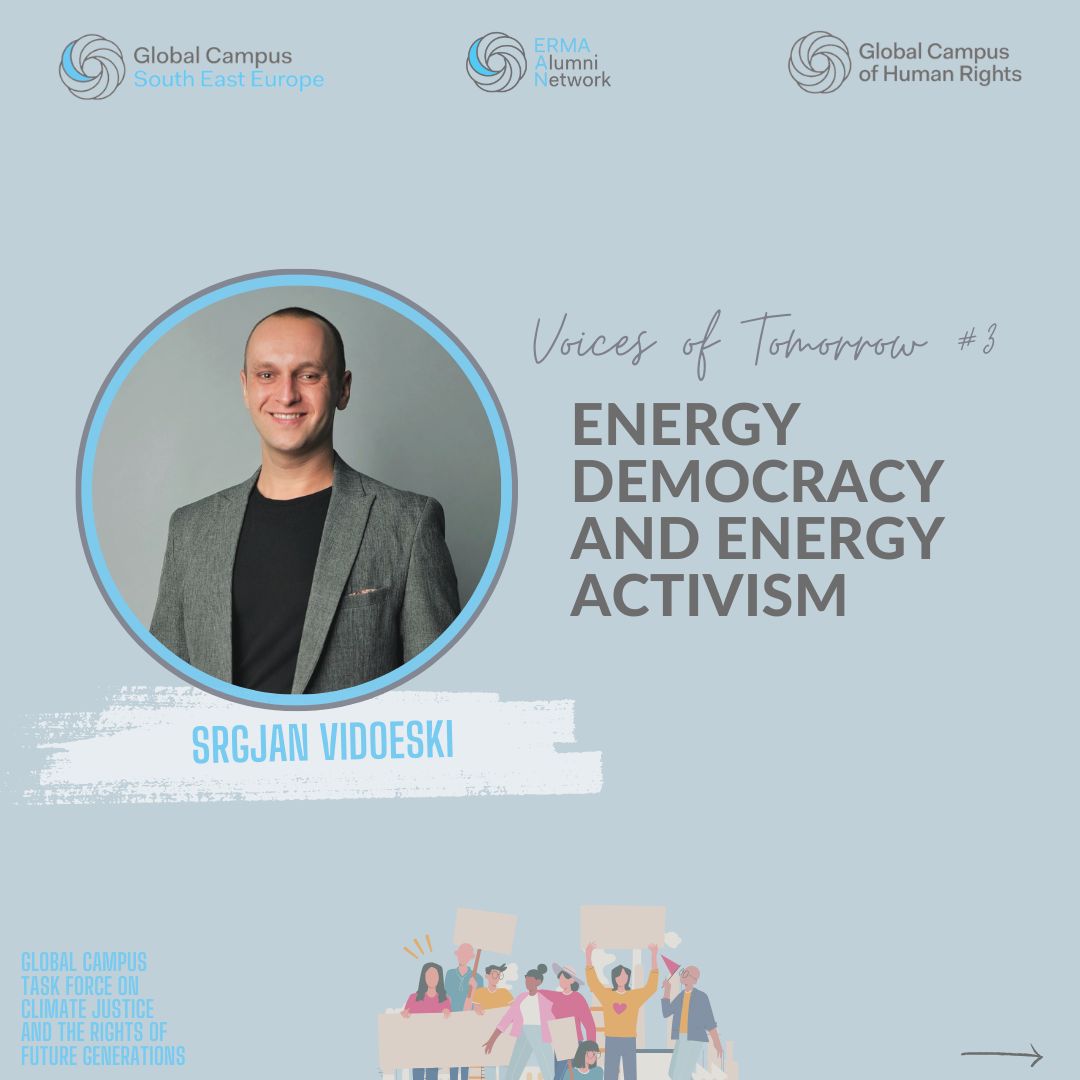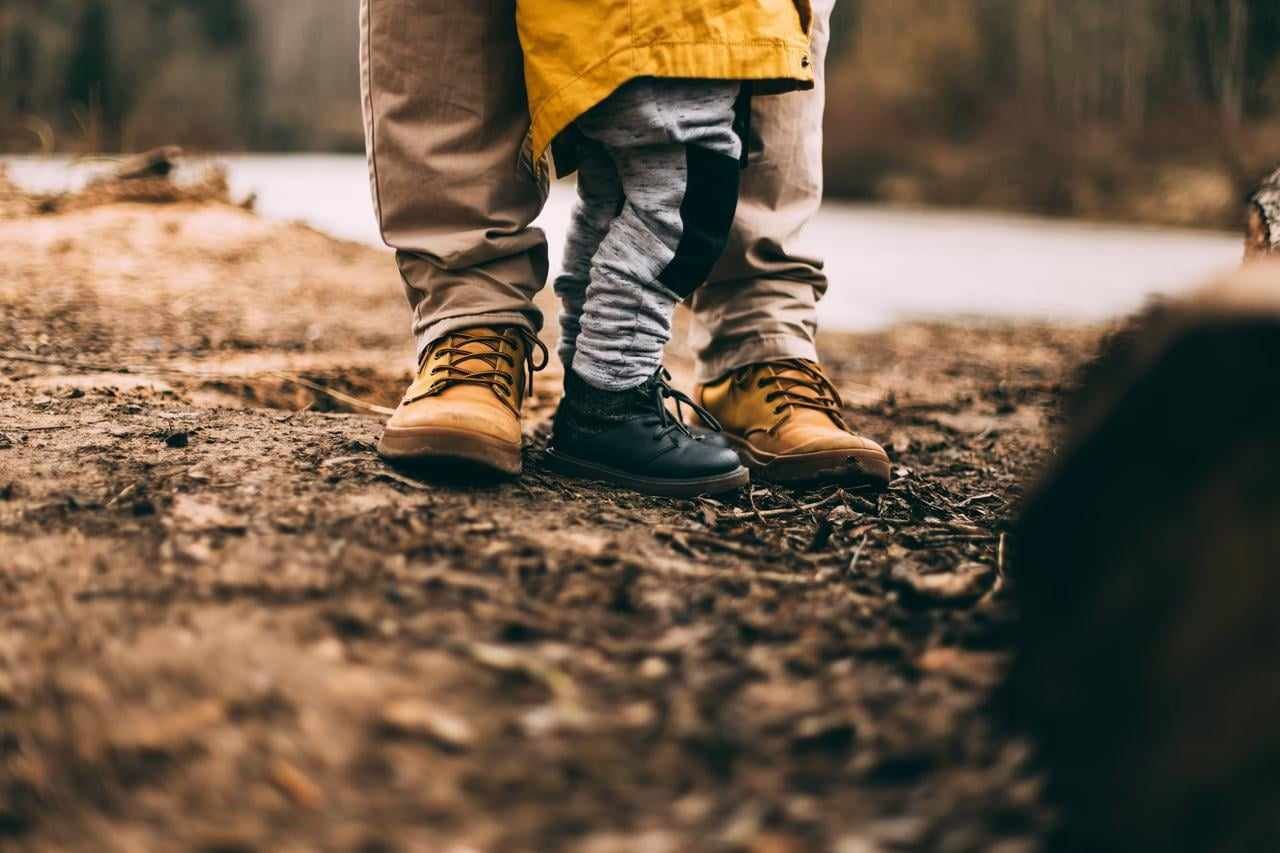Voices for Tomorrow (VfT) lecture series, by the ERMA Alumni Taskforce on Climate Justice and the Rights of Future Generations.
This series focuses on answering key questions and delving into essential perspectives that can help you develop an understanding of climate justice and the rights of future generations.

Energy Democracy and Energy Activism- with Srgjan Vidoeski (ERMA 2019-20)
In this session, we delve deeper into energy democracy that empowers communities to take control of their energy futures, ensuring equitable access and decision-making power, and energy activism that ignites change, mobilizing individuals and groups to challenge existing power structures and advocate for sustainable solutions.
💡 By connecting the dots between climate justice and energy democracy, we amplify our commitment to inclusive implementation and advocate for a sustainable future for all. Don’t miss out on this invaluable resource.
If the video above does not play, kindly find it through this link.
#3 INTERGENERATIONAL EQUITY
#3 INTERGENERATIONAL EQUITY
🤔 What is intergenerational equity?
The terms “intergenerational equity” or “intergenerational justice”, have been used interchangeably since the 1980s. They represent a widely recognized principle of international environmental law which requires the preservation of the earth’s natural resources and the environment for the benefit of future generations.
🤔 Why is it important?
Climate change and its various current adverse impacts (greenhouse emissions, heatwaves, floods, disruption of food systems, diseases and mental health issues) will directly affect the generations to come. Among them, the most vulnerable ones will be disproportionately affected. Intergenerational justice recognizes the human rights of the humans not yet born and focuses on the responsibility of the living generations to take measures -today – to protect the future ones.
Although the principal used to be rarely invoked in court rulings, there is an increasing number of
🌟 Important Judgements on Intergenerational Justice🌟
🎯 Held v Montana / United States. This landmark climate ruling bars the state from taking any current action that would negatively affect future generations. It thus becomes a precedent for future suits in those states that do have environmental rights provisions, and an already-established jurisprudence that allows for suits to be brought by individuals and NGOs under those provisions.
🎯 2021 Neubauer, et al. v. Germany. In this case, the German youth challenged Germany’s Federal Climate Protection Act at the Federal Constitutional Court arguing that the target under the legislation of reducing GHGs by 55% until 2030 from 1990 levels was insufficient. The Court struck down parts of the legislation stating that the obligation under the Basic Law extended beyond protecting the climate and “also concerns how environmental burdens are spread out between different generations”.
🎯 2020 Urgenda Foundation v. State of Netherlands, the Dutch Supreme Court held that the government had a duty to protect the rights to life and home from the threat of climate change, but did not feel the need to decide on whether plaintiffs could represent future generations by noting that; “After all, it is without a doubt plausible that the current generation of Dutch nationals, in particular but not limited to the younger individuals in this group, will have to deal with the adverse effects of climate change in their lifetime.”

#2- Rights of future generations.
#2 RIGHTS OF FUTURE GENERATIONS
⚡ What are the “rights of future generations”?
The human rights belonging to humans not yet born, but dependent on the actions of the living generations.
⚡ Why are they important?
Whether “future generations” are rights holders is one of the central questions in contemporary human rights philosophy, law, and political campaigns. Who is considered a subject of human rights is never a given. Today, one of the major struggles for rights concerns the acknowledgement of “future generations.”
🌟 The issue becomes especially salient when we think of climate change: current generations destroy the planet. Do future generations not have the rights to a clean environment and life recognised for current generations? Indeed, they are particularly vulnerable for rights violations.
💪 In some countries, the rights of future generations are already enshrined in national law. The UNCRC General Comment 26 has also recognised future generations to be rights holders.The Maastricht Principles on the Human Rights of Future Generations adopted in February 2023, make a clear statement of States’ and other actors obligations under international and human rights law and are already endorsed by a wide range of global experts and current and former UN mandate holders.
Court decisions on climate litigation have recognised either indirectly or explicitly the rights of future generations:
🎯 The First Senate of the German Federal Constitutional Court Decision on “Klimaschutzgesetz (Climate Protection Act), KS” / 2021 highlighted that the German Constitution entails the element of Solidarity. By declaring that the Climate Protection Act was unconstitutional the Court has given an explicit answer that climate solidarity extended to future generations.
🎯 The Colombian Supreme Court Decision on “Future Generations v Colombia” / 2018 examined child rights violations by the State of Colombia and explicitly recognised the environmental rights of the future generations in the decision, based on the ethical duty of solidarity of the species and the intrinsic value of the future.
Dive into the rights of future generations:
👉 https://lnkd.in/dP3bpZ_d
👉 https://lnkd.in/djFkrgw7
👉 Hiskes, R. P. (2005). The Right to a Green Future: Human Rights, Environmentalism, and Intergenerational Justice [research-article]. Human Rights Quarterly, 27(4), 1346-1364.
👉 Lewis, B. (2018). The Rights of Future Generations within the Post-Paris Climate Regime [article]. Transnational Environmental Law, 7(1), 69-88.
👉 Lewis, B., & Poff, D. (2023). Human Rights Duties Towards Future Generations and Achieving Climate Justice. Springer International Publishing.
#4 Climate Change - An Opportunity for Gender Equality
The lecture: Climate Change – An Opportunity for Gender Equality, with Our alumna Azra Sehic (ERMA 2008-09), explores the pivotal role gender equality plays in addressing the climate crisis.
eal with the adverse effects of climate change in their lifetime.”
Keep in touch by following the Global Campus South East Europe (GCSEE/ERMA) on LinkedIn.
